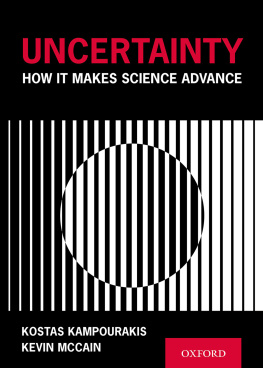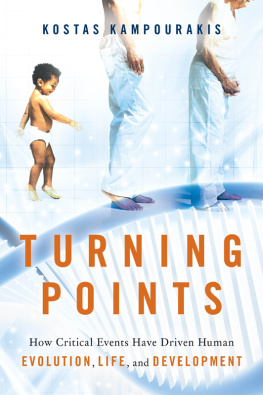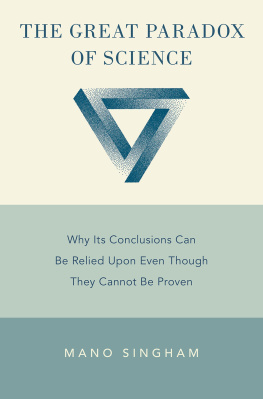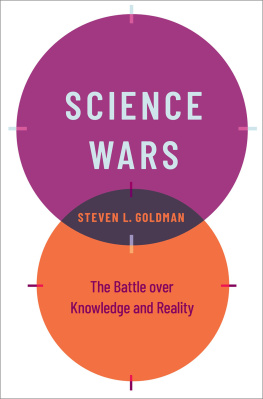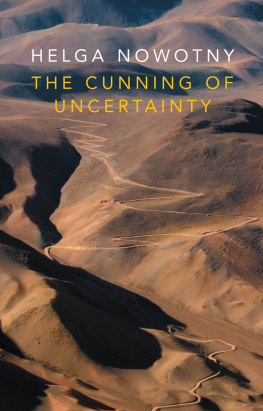UNCERTAINTY

Oxford University Press is a department of the University of Oxford. It furthers the Universitys objective of excellence in research, scholarship, and education by publishing worldwide. Oxford is a registered trade mark of Oxford University Press in the UK and certain other countries.
Published in the United States of America by Oxford University Press
198 Madison Avenue, New York, NY 10016, United States of America.
Oxford University Press 2020
All rights reserved. No part of this publication may be reproduced, stored in a retrieval system, or transmitted, in any form or by any means, without the prior permission in writing of Oxford University Press, or as expressly permitted by law, by license, or under terms agreed with the appropriate reproduction rights organization. Inquiries concerning reproduction outside the scope of the above should be sent to the Rights Department, Oxford University Press, at the address above.
You must not circulate this work in any other form and you must impose this same condition on any acquirer.
CIP data is on file at the Library of Congress
ISBN 9780190871666
eISBN 9780190871680
For our children, Kaison James McCain, Giorgos Kampourakis, and Mirka Kampouraki; may you come to understand uncertainty and have no fear of it.
Contents
Science. This term is used to refer to a variety of theories, models, explanations, concepts, practices, attitudes, approaches, and more that relate to the study of the natural world. Philosophers have shown that there is no single entity to refer to as science; instead, there are a variety of disciplines that study the natural world with a variety of methods and explanatory aims. Therefore, it is more appropriate to refer to sciences, plural, in order to account for this variety. However, it seems that in general we are stuck with the term science, especially when it comes to the public sphere. Even though lay people may not be able to provide a concise definition of what science is, they most likely have no doubt about what the term means. This becomes evident in polls that aim at documenting their views about and attitudes toward science. Therefore, we have decided to use the term science throughout this book to refer to the habits of mind, methods, approaches, and body of knowledge that aim to provide an empirical understanding of the natural world.
Inspired by Stuart Firesteins books Ignorance and Failure, we decided to write a book that discusses another important and inherent feature of science: uncertainty. Our goal is to show that uncertainty is an inescapable feature of science that, counterintuitive as it might sound, does not prevent us from gaining scientific knowledge and understanding. As individuals, and as societies, we need to understand and accept uncertainty in science. Perhaps surprisingly, it is because of this feature that science has made, and still makes, important advancements. Uncertainty motivates further research and a better understanding of natural phenomena. Scientific knowledge is perhaps the sort of knowledge that is as close to certainty as we can get, but this only means that it is closer to being certain than other kinds of knowledge, not that it is absolutely so. Whereas nothing compares to scientific knowledge when it comes to understanding the natural world around us, such knowledge is at the same time flexible enough to accommodate new findings. This happens because continuous research deals better and better with uncertainty and produces an increasingly reliable body of knowledge on the basis of solid evidence and rational thinking. Uncertainty is thus the driving force in this quest: it leads to more research, which in turn serves the ultimate goal of scienceunderstanding.
People have strived for certainty throughout the centuries through oracles, horoscopes, and other superstitious endeavors. However, the only certainty in human life is death, and even when this will occur is highly uncertain. At times people have tried to remove uncertainty from their lives by adopting various forms of fundamentalism (religious, ideological, etc.) that provide them with a false sense of certainty that often has dangerous consequences. In recent years, some people have turned to science in the quest for certainty. It is unfortunate that this at times leads to a sort of fundamentalism as well, which arises when people consider (and expect) science to be certain. But this is a misunderstanding of the nature of science. Even though we can be extremely confident about the conclusions of science, it is full of uncertainties that we need to understand and appreciate.
Our aim is to reach a broad audience and provide them with an authentic account of how science is done, what difficulties scientists face, the knowledge and understanding they can arrive at, and why uncertainty is an inherent feature of all these. We believe that people need to understand that uncertainty in science is not a problem; being unaware of uncertainty and reaching unfounded conclusions is the real problem. In contrast, awareness of the uncertainties inherent in all scientific practices may allow for a more solid and deeper understanding of science and the natural phenomena it studies. This is how uncertainty actually makes science advance. We hope that by the end of the book the reader will have understood and appreciated the impact of uncertainty in science. We must note at this point that our coverage is far from exhaustive. In order to maintain a reasonable length, we have only touched on the important topics and limited our case studies to just six scientific domains. The interested reader who wants to explore some of the topics of this book further will find several excellent books and articles mentioned in the Notes at the end of the book.
We are indebted to Joan Bossert, our editor at Oxford University Press, who supported this project from the start and steered it in the right direction. As we have mentioned, the inspiration for writing this book came when we read Stuart Firesteins books Ignorance and Failure, and we thought that a similar book on uncertainty in science might be as useful as these. Incidentally, we are extremely happy that, like the Firestein books, this one is published by Oxford University Press. We are also indebted to the following scholars for reading the manuscript and kindly providing us with feedback: Gerd Gigerenzer, Sheldon Krimsky, Molly McCain, Ted Poston, Henk de Regt, and Michael Ruse. Finally, we are grateful to Phil Velinov as well as the staff at Newgen who worked with us toward the publication of the present book.
This book is dedicated to our children with the hope that they will come to understand uncertainty and have no fear of it. We hope that the same is true of you after you finish reading it.
Our new Constitution is now established, and has an appearance that promises permanency; but in this world nothing can be said to be certain, except death and taxes.
Benjamin Franklin, in a letter to Jean-Baptiste Leroy, 1789
What Is Knowledge Anyway?
Heres something that is uncontroversial (for everyone but the most ardent skeptics, anyway): you know lots of things. For example, you know that you are reading this book right now, you know that the earth is roughly spherical in shape, you know your phone number, you know your name, you know what trees look like, you know that Columbus sailed in 1492, and so on. Here is something else thats uncontroversial (even ardent skeptics agree on this): there are a lot of things you dont know. You dont know who will win each future US presidential election, you dont know whether a fair coin will land heads or tails each time it is flipped, you dont know what color shirts we were wearing while we were writing this book, you dont know on what day the event that led to the extinction of the dinosaurs occurred, and so on. Indeed, there is an enormous number of things that you dont know. Dont feel bad about thisthis isnt just true of you; it is true of everyone. We all know many things, but there are also many things that we dont know. Here, an interesting question arises: What is the difference between knowing and not knowing?

